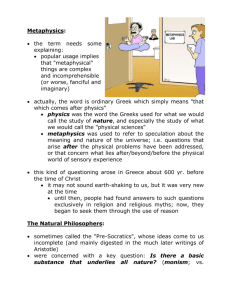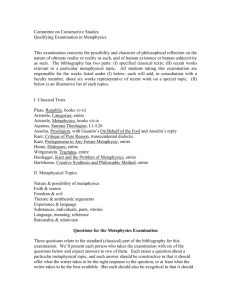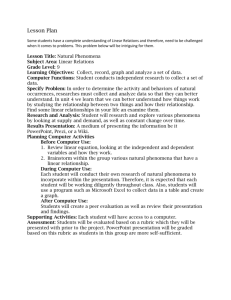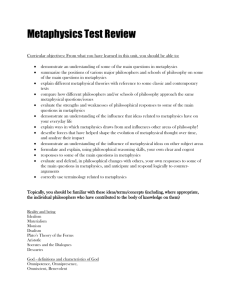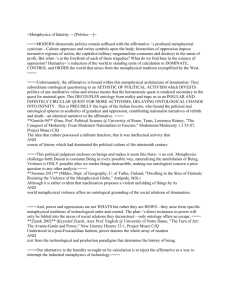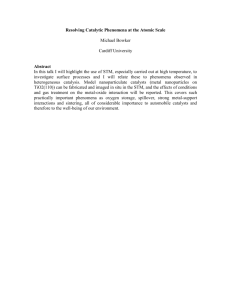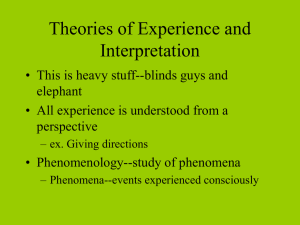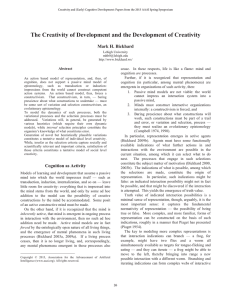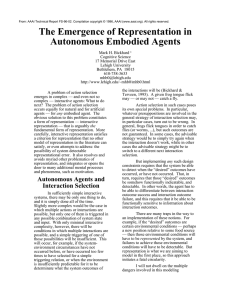Interactivism: Introduction to the Special Issue
advertisement
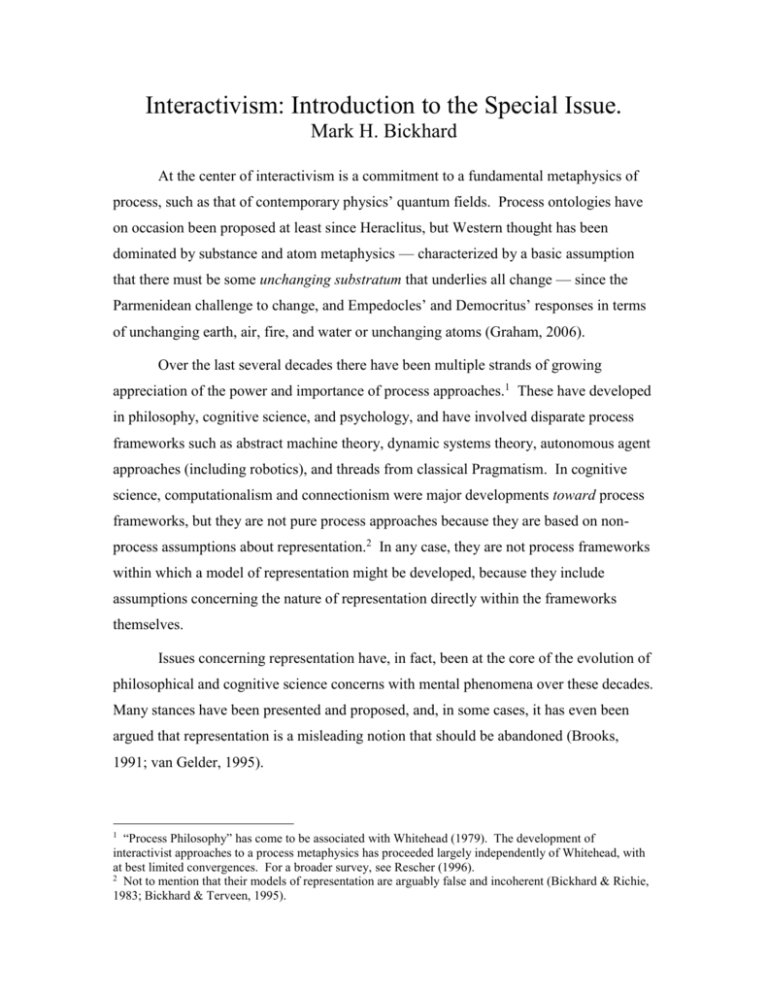
Interactivism: Introduction to the Special Issue. Mark H. Bickhard At the center of interactivism is a commitment to a fundamental metaphysics of process, such as that of contemporary physics’ quantum fields. Process ontologies have on occasion been proposed at least since Heraclitus, but Western thought has been dominated by substance and atom metaphysics — characterized by a basic assumption that there must be some unchanging substratum that underlies all change — since the Parmenidean challenge to change, and Empedocles’ and Democritus’ responses in terms of unchanging earth, air, fire, and water or unchanging atoms (Graham, 2006). Over the last several decades there have been multiple strands of growing appreciation of the power and importance of process approaches.1 These have developed in philosophy, cognitive science, and psychology, and have involved disparate process frameworks such as abstract machine theory, dynamic systems theory, autonomous agent approaches (including robotics), and threads from classical Pragmatism. In cognitive science, computationalism and connectionism were major developments toward process frameworks, but they are not pure process approaches because they are based on nonprocess assumptions about representation.2 In any case, they are not process frameworks within which a model of representation might be developed, because they include assumptions concerning the nature of representation directly within the frameworks themselves. Issues concerning representation have, in fact, been at the core of the evolution of philosophical and cognitive science concerns with mental phenomena over these decades. Many stances have been presented and proposed, and, in some cases, it has even been argued that representation is a misleading notion that should be abandoned (Brooks, 1991; van Gelder, 1995). 1 “Process Philosophy” has come to be associated with Whitehead (1979). The development of interactivist approaches to a process metaphysics has proceeded largely independently of Whitehead, with at best limited convergences. For a broader survey, see Rescher (1996). 2 Not to mention that their models of representation are arguably false and incoherent (Bickhard & Richie, 1983; Bickhard & Terveen, 1995). Interactivism began with a strict process metaphysical framework, and a central focus on cognition and representation (Bickhard, 1973, 1980). In fact, interactivism is so named because of the centrality of action and interaction to the model of the nature of representation (Vuyk, 1981).3 There has, then, been a growing, if diverse and diffuse, appreciation of process frameworks. However, they are not and have never constituted a unified or dominant approach. Consequently the early interactivist models of cognition and representation involved process assumptions that differed at fundamental metaphysical levels from the presuppositions of most work addressing mental phenomena. This rendered it impossible to integrate the interactive model with most extant models in related domains, and thereby forced either abandoning the original model or extending it to include an ever widening range of phenomena. Over time, the latter process has produced a semisystematic philosophy and theory within that philosophy, and it has encountered and integrated with multiple independently developed but convergent activities of process modeling. The articles in this special issue constitute an illustrative sampling of work being done within this broad framework. They begin with a focus on the basic metaphysics of process, especially concerning ontological emergence in organizations of process. Within this framework, organism and agency are modeled as emergents of particular kinds of process organizations, with simple forms of normativity (such as normative function and representation) emergent in such agency. The emphasis here is strongest on the basic metaphysics and models of foundational biological and normative phenomena, though there are also discussions of, for example, agency, language, and analogy. Richard Campbell begins with an overview of a hierarchy of metaphysical differentiations, beginning with a process background, and ending with characterizations of emergent action and agency as metaphysically deep phenomena. This hierarchy of differentiations illustrates a framework of metaphysical issues that are quite unlike those 3 This is in partial convergence with Piaget (e.g., 1954, 1971), and, also partial, with Pragmatism (Joas, 1993). The Pragmatist influence on Piaget is from Peirce and James, through Baldwin, to Piaget. that have dominated substance and particle based metaphysical approaches for multiple centuries. Johanna Seibt presents a formal4 ontology of process — General Process Theory — that, beginning with the most fundamental notion of general process, formally develops multiple notions of causal, mechanistic, functional, and self-maintenant emergent interactions. Functional and self-maintenant processes, in particular, are central to the interactive model, thus illustrating both the power of the General Process Theory in being able to address such phenomena, as well as the formal ontological coherence of such interactivist notions. Cliff Hooker begins with the interactivist biological constitution of life, grounding it in a form of recursive self-maintenance called autonomy that suffices for the emergence of normative agency. From there he explores the evolution of internal regulatory capacities, with self-directed anticipative learning as a most general and intelligent culmination, extending also to science. Self-directed anticipative learning constitutes a means for solving open problems — those that are at best vaguely specified in advance — that not only comprise most real world problems, including scientific research questions, but also cannot be captured using familiar cognitive tools. Mark Bickhard outlines the classical core interactivist model. There is an emphasis on the nature of ontological emergence, and, within that framework, on two forms of normative emergence: 1) normative biological function, and 2) representation. There are then short discussions of changes forced by the interactivist framework in models of three cognitive phenomena: 1) perception, 2) learning, and 3) language. Alex Levine makes use of a novel epistemological consequence of interactivism — a partition epistemology — to address what has heretofore remained a puzzle in the philosophy of science: the compelling character of scientific analogies. Analogy as a source of ideas makes sense within classical frameworks, but analogy as a source of rational warrant is at best difficult to account for. Here such warrant is accounted for. 4 Non-Whiteheadian. These papers are a sampling of work within the broader framework. They do not address, for example, such phenomena as motivation, emotion, or reflective consciousness, nor such issues as central nervous system realizations of the modeled processes, or the emergence of the social person. We hope, nevertheless, that they demonstrate the power and scope of the interactivist approach, and of process metaphysical approaches more broadly. References Bickhard, M. H. (1973). A Model of Developmental and Psychological Processes. Ph. D. Dissertation, University of Chicago. Published in part as: Bickhard, M. H. (1980). A Model of Developmental and Psychological Processes. Genetic Psychology Monographs, 102, 61-116. Bickhard, M. H. (1980). Cognition, Convention, and Communication. New York: Praeger Publishers. Bickhard, M. H., Richie, D. M. (1983). On the Nature of Representation: A Case Study of James Gibson’s Theory of Perception. New York: Praeger Publishers. Bickhard, M. H., Terveen, L. (1995). Foundational Issues in Artificial Intelligence and Cognitive Science: Impasse and Solution. Elsevier Scientific. Brooks, R. A. (1991). Intelligence without Representation. Artificial Intelligence, 47(13), 139-159. Graham, D. W. (2006). Explaining the Cosmos. Princeton, NJ: Princeton University Press. Joas, H. (1993). American Pragmatism and German Thought: A History of Misunderstandings. In H. Joas Pragmatism and Social Theory. (94-121). Chicago: University of Chicago Press. Piaget, J. (1954). The Construction of Reality in the Child. New York: Basic. Piaget, J. (1971). Biology and Knowledge. Chicago: University of Chicago Press. Rescher, N. (1996). Process Metaphysics. Albany: SUNY Press. van Gelder, T. J. (1995). What Might Cognition Be, If Not Computation? The Journal of Philosophy, XCII(7), 345-381. Vuyk, R. (1981). Piaget's Genetic Epistemology 1965-1980. vol. II New York: Academic. Whitehead, A. N. (1979). Process and Reality. 2nd Ed. New York: Free Press.
